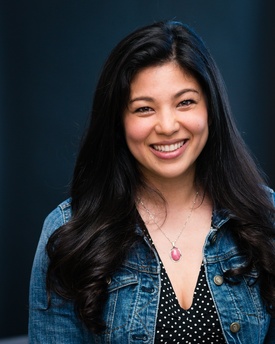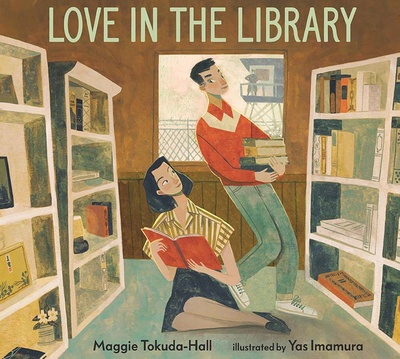Maggie Tokuda-Hall is an award winning author of children’s and young adult (YA) books. Her titles include Also an Octopus, about an octopus who builds a space ship, The Mermaid, The Witch and The Sea, about, well, you guessed it, a mermaid and a witch, and Squad, a coming-of-age story featuring teenage werewolves. But her most recent book, Love in the Library, published in 2022, is firmly rooted in real life. It’s the story of how her grandparents met and fell in love while incarcerated at Minidoka War Relocation Center during World War II.
It’s a story about hope and love and miracles in the face of injustice. Racism was at the heart of the injustice that created Minidoka and dozens of other camps, detention centers and prisons for Japanese Americans. Tokuda-Hall said as much in her author’s note for Love in the Library. That’s apparently unacceptable in certain political circles today as increasing numbers of book bans at school libraries seek to shield children from difficult chapters in America’s history.
Recently, Scholastic Publishing Company, which bills itself as “the world’s largest publisher and distributor of children’s books,” wanted to license Love in the Library for use in the classroom. But there was a catch. Scholastic insisted that Tokuda-Hall remove the word, “racism” in a key paragraph providing historical context for the story from the author’s note. She said no.
The opportunity to have a book published by Scholastic is one very few authors decline. Tokuda-Hall’s refusal to accede to Scholastic’s demands has struck a national nerve, resulting in feature articles in the New York Times and NPR, among other news outlets.
Discover Nikkei had questions. Interviewed via email, Tokuda-Hall answered.
* * * * *
Can you provide a brief bio that includes how your family, your ancestry and your childhood interests influenced your writing career?
I’m half Japanese American, half Ashkenazi Jew. Both sides of my family are stacked with storytellers. Actors, writers, producers. My mother is a journalist. My whole life, stories have been how I was taught to make sense of the world, and so it’s little surprise that I made storytelling into my profession. It’s what I know best.
I wasn’t actually a great reader as a kid. I was often intimidated by chapter books, and their long, unbroken passages of text. I try to keep that kind of reader in mind as I write now.
You write YA and children’s books. Why did you decide to write for younger audiences and present them with complex topics and characters?
My very first job out of college was as a children’s bookseller, and from then on children’s literature has been my life. I was, and am still, obsessed. Kids’ are incredibly discerning readers. If it’s not interesting, if they’re not having a good time, if they’re bored, they will leave. They’re merciless. I love them for that. For their absolute absence of pretense.
And I know that kids are capable, smart, and empathetic. Stories can give them the tools they need to better understand the world and their place in it, and also help them see what about the world they can change. Not all my books are for every kid, but when I sit down to write I am always considering how best to ensure I am telling the truth, even when I’m telling stories with werewolves or mermaids or whatever. Philosophically, I am of the mind that children are people and people deserve respect.
Did you anticipate Scholastic’s request to erase the parallels you drew between historical and contemporary examples of racism in the US? How was your work received prior to the current culture wars and book bans?
I had not expected anything about the situation. I wasn’t expecting a licensing deal (the book had already been out a year) and I did not expect that if one came they would ask for edits. Once I saw that my deal was contingent on an edit, however, I assumed correctly which paragraph would be cut. But even knowing they had edits, I was still shocked that they cut the word "racism: altogether.
Before all of this Love in the Library was obscure enough to mostly only receive positive feedback. However, about once a month I get an angry letter about my author’s note, occasionally full of racial slurs but more often chastising my tone, or positing that in fact racism is a global problem and not a uniquely American one.
I actually agree with that, however I never claimed that it was uniquely American in the note. I think often this "well what about" tactic is used to minimize the truth of American problems. It’s like telling someone in a physically abusive relationship they shouldn’t complain because physically abusive relationships have existed throughout history. Like, Ok?
But also I would like to stop getting hit, right now too. Ironically, I also get a lot of emails from people who yell at me for the crimes the nation of Japan committed. That inability to differentiate between the Japanese government and Japanese Americans remains an enduring problem. My most favorite bit of hate mail was just someone who wrote "you’re boring, shut up." I don’t know why but it made me laugh so hard. Thanks for reaching out, I guess!
According to a New York Times article, 650 authors signed a letter to Scholastic supporting your position. Can you comment on how you see this affecting writers and publishers?
I don't know yet. Time will tell. I hope it emboldens more authors to refuse cooperating with the very forces in our politics that would see us silenced.
There’s an article in The Guardian about groups such as the Friends of Minidoka protesting a proposed wind farm very near to the Minidoka National Historic Site. One of the survivors, Mary Abo, who made a pilgrimage to the site was quoted as saying, “It’s good to see we weren’t broken people.” Love in the Library offers readers a story of miracles and resilience in the face of injustice. How does the concept of resilience figure into your writing and advocacy?
It’s important to me and to this particular story. I wanted to give kids hope in the face of honesty. But I don’t want to say anything that would devalue the stories of those who do not survive marginalization. Not everyone does. And those people deserve to have their stories honored, too.
You have a number of books coming out this year. Is there a common thread running through your work? What can your readers look forward to?
All of my books are wildly different, but I try to be emotionally honest in all of them. The only unifying characteristic is, I suppose, the point of origin, which is my brain meat. In 2024 I have a graphic novel about girl samurais doing revenge and fighting monsters and farts and stuff called The Worst Rōnin. I hope people enjoy it. I had a real good time writing it. Eventually, Yas (Yas Imamura, Love in the Library illustrator) and I will have another picture book together, but that’s so far off I don’t even know if it’s worth mentioning.
Tokuda-Hall’s readers have much to look forward to. Read about Tokuda-Hall’s meeting with Scholastic on her blog.
© 2023 Esther Newman







